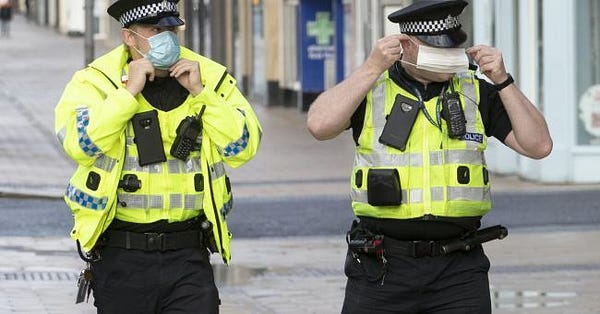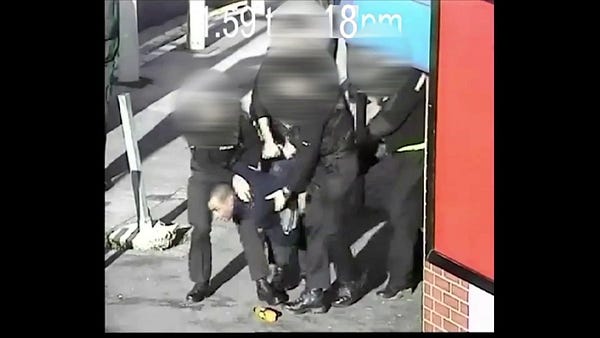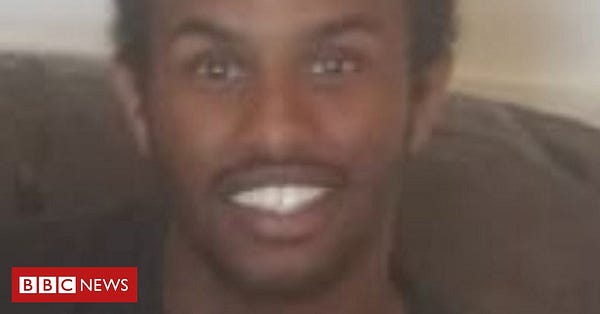January 2021: Lockdown 3 – 0 Lessons learnt
Some police officers actions seek total compliance from the public, even while others flaunt the rules
Dear StopWatchers,
Happy New Year to you all. StopWatch wish you the best of luck surviving this pandemic and to keep the faith that we can pull through these difficult times.
Media coverage of UK policing has brought us back to the central problem of policing during a public health emergency: that, to paraphrase Liberty, you can’t police your way out of it. Many of the incidents you will have heard about also raise the concern that in these dangerous times, the police are keener to make people comply to their every word, than to feel safe. But we will continue to remind them that fairness and accountability ought to be a core part of police practice, pandemic or not.
We also would like to announce that after two-and-a-half years, Katrina Ffrench stepped down before Christmas as our chief executive. We are grateful for all the hard work that Katrina has put in over this time and she leaves StopWatch as an organisation in a much stronger position.
We are now looking for an executive director to who will drive our work forward. Applications must be sent to recruitment@stop-watch.org by 01 March 2021.
Topics in this newsletter include:
Overpolicing in a pandemic, part 3 – more incidents of heavy handed policing surface in the UK’s third lockdown, leaving us with a strong sense of déjà vu
Study finds evidence of police failings on a gross scale
Police lose files on individuals they probably shouldn’t have been keeping records of anyway
Several historic high profile cases of Black men killed at the hands of the police were covered in mainstream media this month
This month’s Terrible tech covers stories about mobile phone encryption, a poll about a fingerprint app, and the ex surveillance camera commissioner becoming privacy chief for a supplier of facial recognition tech
Please enjoy our roundup of stories below.
Overpolicing in a pandemic, Part 3
We’re one month into a new year and in several ways, it looks remarkably similar to the old one. At the current rate, we may well rechristen 2021 as The Long 2020, as some things have stubbornly refused to disappear, like the pandemic. And the overpolicing of individuals along with it.
The lure of COVID-related overpolicing is irresistible for some forces, it seems. Despite the ire Derbyshire Police received from their infamous drone surveillance advert shaming people for taking socially distanced walks a little further out from home than they would have liked, they still saw fit to target a couple of friends who had driven to a spot for a walk (BBC News, 08 Jan).
Two women have described how they were surrounded by police, read their rights and fined £200 each after driving five miles to take a walk.
The women were also told the hot drinks they had brought along were not allowed as they were ‘classed as a picnic’.
Guidance for the current lockdown says people can travel for exercise as long as it is in their ‘local area’.
The police force involved, Derbyshire Police, said driving for exercise was ‘not in the spirit’ of lockdown.
Health secretary Matt Hancock ‘absolutely’ backed the move (Metro UK, 10 Jan), and justice was done. Until the fines were rescinded (Metro UK, 11 Jan):
After gaining considerable media attention over the weekend, Derbyshire Police’s Chief Constable Rachel Swann said today the two fines ‘have been withdrawn and we have notified the women directly, apologising for any concern caused’.
Meanwhile, Lancashire Police decided to announce the return of stop and account, asking people ‘not to be offended’ if they are stopped and spoken to (Lancashire Telegraph, 15 Jan).


For some, the feeling was mutual.
Met police chief Cressida Dick told Nick Ferrari on LBC: ‘It is preposterous to me that anyone could be unaware of our duty to do all we can to stop the spread of the virus’. Yet, just a few days later, nine of her own were caught enjoying a not-so-socially-distanced activity at a cafe (Metro UK, 20 Jan).
And again a few days after that.


Perhaps we expect too much from our law enforcers? After all, we’ve only had the coronavirus regulations for nine months. Officers can’t possibly be expected to calmly engage, explain, and encourage before enforcing the law, can they? Oh, and turn their camera on while doing so, lest they be caught harassing members of the public, calling them idiots?

Or perhaps correcting for heavy handed policing after a national backlash is a very painful form of policing by consent. It’s embarrassing for any force, but three lockdowns into a pandemic, these incidents continue, because officers don’t bother to follow the rules or their own guidance for policing the rules, almost as if they haven’t learnt any lessons from the previous two lockdowns. So who really are the COVIDiots?
Failings on a gross scale
If certain hedge funds could place bets on confidence in the police among those who’d had interactions with them, they would likely cover their losses shorting GameStop several times over.* The retailer probably has better customer service standards too (The Guardian, 08, Jan):
Britain’s largest police force [the Metropolitan police] will have to justify its use of handcuffs following a review that was triggered after the stop and search of Olympic athlete Bianca Williams.
Recommendations include ‘additional legal training, extended officer safety and improved personal safety training for police officers, de-escalation tactics and more community input to understand the respective experiences of each during encounters’.
We do hope the Met will GOWISELY with their recommendations. As for conduct, our police are in a class of their own (The Guardian, 18 Jan):
Figures released by the Independent Office for Police Conduct (IOPC) show 641 officers in England and Wales may have so seriously breached standards that they were liable to be sacked between 2015 and 2020, but just 54 (8·4%) were fired after disciplinary action was conducted internally.
Another 848 officers were found to have a case to answer over possible misconduct, but in total only 363 of the misconduct claims have so far been upheld following IOPC recommendations.
There were official warnings in 151 of these cases, and 16 retirements or resignations… The IOPC received statutory powers in February [2020] to ensure forces investigate those found to have a case to answer, but internal police disciplinary panels still have the final say and the watchdog said its role is not to be ‘judge and jury’.
The figures, obtained through freedom of information requests, raise questions about the efficacy of the IOPC, which receives £71m per year from the Home Office.
One reason for the poor outcomes might be down to former chief superintendent Victor Olisa’s suggestion that officers ‘run rings round IOPC investigators’ and that the relationship was unequal.
Mike Cunningham – ex-chief of the College of Policing – also popped up from the safe zone of career retirement to lament the ‘eye watering’ racial disparity between Black and White men on stop and searches (The Guardian, 19 Jan):
It is absolutely starkly clear that there is a widespread dissatisfaction with policing from Black people. And, I don’t think anybody should try to dress that up and say, ‘it isn’t real, it’s a mistake, it’s a perception’. Something more needs to be done.
Indeed. But better late than never is not good enough, and worse still when it results in a death of a civilian in police custody. At the Home Affairs Committee police conduct and complaints oral evidence session, Deborah Coles of INQUEST made the point that despite raising very serious questions about excessive and unlawful use of force or serious neglect, ‘disciplinary or criminal charges and sanctions against police officers are extremely rare’, and that raises ‘grave concerns about the lack of accountability after deaths, both at an individual level but also at a senior management level, and the lack of structural change’ (UK Parliament, 27 Jan):
It is important to point out that there has never been a successful prosecution of any police officer for murder or manslaughter and, even where misconduct proceedings are held, sanctions too often fail to reflect the gravity of ill treatment. This sends out a message, I think, that somehow these deaths don’t matter, and also points to a police complaints system that is not capable of doing its job.
However, if you are hoping for a full and frank admission of how the combination of overpolicing and an inefficient police complaints system fuels communities’ mistrust across the country, you’ll be waiting a long time, if the comments from Phill Matthews of the Police Federation of England & Wales are anything to go by.


* StopWatch does not offer gambling advice; any bets you place are at your own risk. We have no stock market expertise (which may not be a bad thing, considering…)
For the record
Remember the heady days of the 2000s when the Home Office used to get flak for its employees losing files on trains, its contractors losing all prisoners’ details on a memory stick, and losing too many laptops and mobile phones to even count?
Well, a little over a decade on, we have ‘The Lost Files: Redux’, with reports of the police losing ‘more than 150,000 fingerprint, DNA and arrest history records after accidentally wiping them from national policing systems’ (Computer Weekly, 15 Jan).
Policing minister Kit Malthouse said that ‘a standard housekeeping process that runs on the Police National Computer [PNC] deleted a number of records in error’, and that ‘a fast time review has identified the problem and corrected the process, so it cannot happen again’.
Malthouse added: ‘The Home Office, the National Police Chiefs Council and other law enforcement partners are working at pace to recover the data [How? With what backup?]. While the loss relates to individuals who were arrested and then released with no further action [actually, scratch that, why were you keeping data on innocent individuals?!], I have asked officials and the police to confirm their initial assessment that there is no threat to public safety.’ [interjections ours]
Phew, thank goodness for that. Who knows what chaos would have come about if those records mattered… sorry, did we say 150,000? We meant 400,000 (The Register, 18 Jan).


All of which leaves us with a niggling doubt in the face of policy wins such as the Met police’s agreement to record the ethnicity of people stopped in cars.

It is vital that the six-month pilot is done right, so we all know what is really going on with vehicle stop and searches. It won’t do for us to have these records lost too.
Kevin Clarke, Sheku Bayoh, Leon Briggs and more
Several historic high profile cases of Black men killed at the hands of the police were covered in mainstream media this month. BBC Panorama looked at the circumstances surrounding the fatal arrests of Kevin Clarke and Sheku Bayoh (18 Jan).


This was followed by reports in the Observer that one of the officers cleared of misconduct over Kevin Clarke’s death is to face fresh disciplinary proceedings ‘because of failings in the original case’ (24 Jan).
In the case of Leon Briggs’s inquest, which began on 04 January, footage of the interaction between police officers before his death in 2013 was made publicly available for the first time (Channel 4, 26 Jan).


The inquest will hear evidence from officers involved in his restraint from 01 February (BBC News, 27 Jan).
Unfortunately, we have another name to add to the list of mysterious deaths in police custody. Mohamud Mohammed Hassan was arrested at his Cardiff home on Friday on suspicion of breach of the peace but released without charge on Saturday morning. He died later that evening.


While South Wales police denied they were responsible for his injuries, ‘a post-mortem confirmed that he had numerous bruises both arms, wrists, elbows, left hand and a split lip consistent with being punched or slapped’ (Lee Jasper blog, 24 Jan).
One wonders how many years it will be before any of these families find out the truth, it is the least that our criminal justice system owes them.
Section 60 watch*
London
Brent (02 Jan), Hammersmith & Fulham (17 Jan), Islington (25, 29 Jan), Lewisham (14 Jan)
Thames Valley Police
* This is not a comprehensive list
Terrible tech – phones, prints, privacy
On mobile phones: Whether iOS or Android, this is your regular reminder that law enforcement talk of breaking end-to-encryption to ‘catch the bad guys’ is a red herring because they can bypass it to get access to what they want (WIRED, 17 Jan).
On fingerprinting: Almost no one wants it, according to a survey run by Racial Justice Network and Yorkshire Resists. The feedback from a 2018 pilot of the Biometric Services Gateway mobile fingerprint app found that:
93% did not support the introduction of the program to police forces
96% believe the Biometric Services Gateway is embedded in racial profiling
89% felt police should not have access to immigration data
88% of migrant respondents said they would not feel safe to go to the police for help or to report a crime

Privacy for private companies: In yet another example of someone swinging the revolving door of regulatory capture open in the honest belief that they can change the culture of the new place of employment they walk into from within, former surveillance camera commissioner Tony Porter is to join facial recognition tech provider Corsight AI (IFSEC Global, 12 Jan):
Porter will be responsible for ensuring the company’s facial recognition technology is not only legally compliant across international jurisdictions, but also operates to the highest ethical standards.
‘By joining Corsight AI, I firmly believe we can help change perceptions surrounding the technology and demonstrate how it can be a force for good,’ said Tony Porter, chief privacy officer for Corsight AI. ‘As part of my role, I am keen to engage with those who are concerned about the technology’s use within society, so we can help Corsight AI provide the great value to society I know it can.’
Looking forward to seeing much finger wagging and tough talking to the company board if/when the police are caught using Corsight’s equipment improperly.
StopWatch is a volunteer led organisation that relies on the generosity of trusts and grant funders to operate. We DO NOT accept funding from the government or police as we believe this would compromise our ability to critically challenge.
We appreciate regular donations via standing order, if you’d like to pledge your long-term support. Details are:
CAF Bank – Registered office: CAF Bank Ltd, 25 Kings Hill Avenue, Kings Hill, West Malling, Kent, ME19 4JQ
Account Name: StopWatch | Sort Code: 40-52-40 | Account Number: 00027415
—
Stay safe,
StopWatch.





